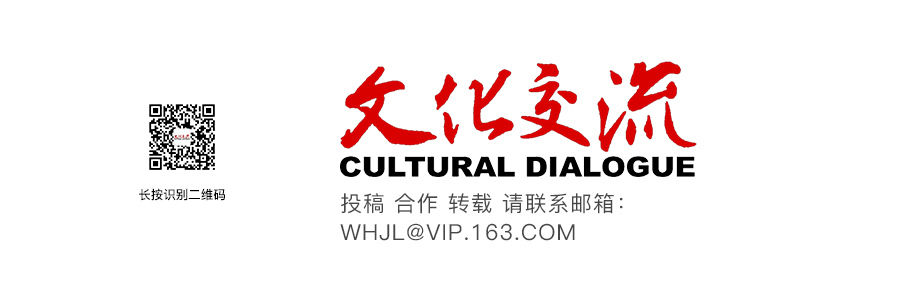3月初,麦家的小说《解密》在其海外译本家族中又增添了波斯语版本。《解密》能在世界范围内广泛传播,离不开《解密》的英文版译者、把麦家带入西方读者视野中的英国青年汉学家、韩国首尔国立大学教授米欧敏(Olivia Milburn)。去年,米欧敏因为翻译麦家作品《解密》《暗算》《风声》,荣获了第12届“中华图书特殊贡献奖”的青年成就奖。
《解密》是茅盾文学奖得主麦家的长篇小说,它的创作跨度长达11年,先后被退稿了17次,最终却“逆袭”成功。目前,《解密》这本书的简体中文版已经出版了逾100万册,不仅在国内颇受赞誉,更是被翻译成30多个语种、在超过100个国家出版。
于是关于《解密》为何能畅销全球有了一次高质量的对话。参加这次对话的,除了米欧敏,还有麦家作品的另一位翻译家克里斯托夫·佩恩(Christopher Payne)以及近10位汉学家,他们共同展开了一场关于文学和命运的精彩对话。
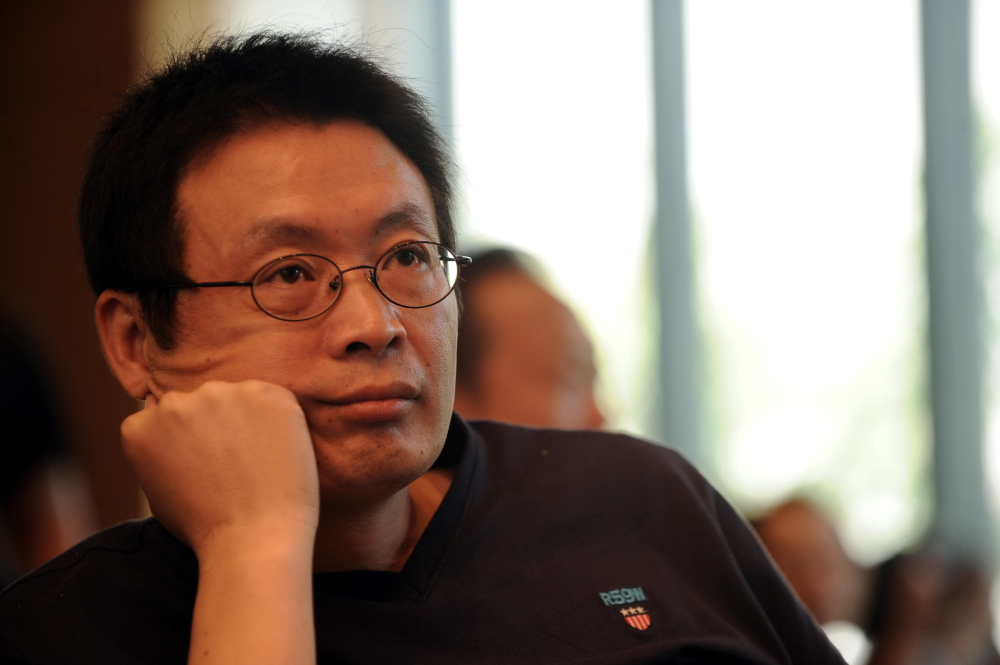
主持人:米欧敏女士,你从看中文版的《解密》到翻译成英文,要跨越一个文化的差异和障碍,你在翻译过程中觉得什么地方是很难跨越过去的?
米欧敏:我是古代汉语教授,阅读的书有《春秋》《论语》。古代汉语难得多,所以翻译《解密》的难度对我来说没觉得有什么。我也一直热爱考古,对文物感兴趣。
麦家:中国有一个博大精深的背影。如果这个背影是苍白的、苍凉的,你们走进去了,也不会对它产生兴趣。但我们的文化真的非常丰富,像米欧敏、克里斯多夫这些教授,他们研究中国很深,他们研究的结果是他们爱上了中国,我觉得这是中国人的骄傲。
我觉得他们所做的,是对中国历史的一种传播,让世界更了解中国,或者说是让中国走向世界。
中国小说需要更多外国翻译家
主持人:麦家老师曾经说过自己不只是在写间谍故事?
麦家:我在国内外都会遇到一个问题,那就是由于影视的原因,“谍战”的商标已经贴得我揭不下来,完全是钢铁般地包着。但是当你带着谍战的期待来看我的小说,有可能会失望,因为我的小说里面没有谍战的基本要素,比如说枪、杀人、情色。在法国,曾有位读者问我,宣传的时候说这本书是一本间谍小说,你为什么要在开始阶段写这么多内容——容氏家族的前世今生,从1876年开始写,真正的主人公登场是到1966年。我回答很简单,我写的不是谍战小说,间谍只不过是主人公的一个职业而已。
米欧敏:确实有这个问题,有人说你是中国的丹·布朗,中国的勒卡雷,读者会以这样的眼光看你的作品,他们一直有这个评价。
麦家:英国的《金融时报》也说这是中国的勒卡雷。但我既不是中国的勒卡雷,也不是中国的丹·布朗,我只不过是中国的麦家而已。美国人丹·布朗写的是一种类型小说,我写的是一种文学小说,这里面没有高下之分。
克里斯托夫:英国和北美的书评家看中国的小说,要找到其中的代表性,比如讲宏大历史、跟当代有关的小说,所以他们看你的小说就不理解了——是新历史小说吗?寻根类小说吗?都不是。说不出麦家老师作品的特点。所以他们觉得要让读者有兴趣,就得跟丹·布朗、勒卡雷比。有书评说这部小说跟丹·布朗、勒卡雷很相似。看了这个书评,我在想,他看的是哪一本书呢?不是麦家的书吧?
麦家:我觉得这个责任应该由你们来承担。为什么他们对中国小说不理解?就是因为你们翻译得太少,你们多翻译一点,不单翻译麦家的,也翻译“家麦”的,多翻译一点我们中国的小说,他们就了解了。幸亏有你们两位把我的小说翻译出去,给我们中国人长了一点面子。坦率地说,我的小说没有故意迎合西方人的胃口,恰恰是这种客观、这种公正,反而赢得了西方读者的尊敬。
米欧敏:但有另外一个问题,英国人、美国人,他们好像不太喜欢看翻译的作品。
麦家:但是我还是很欣慰。2017年我从爱丁堡一直往南边走,走到每一家书店里面,包括圣安德鲁斯的一家小小书店里面,也找到了你们翻译的麦家作品,我很欣慰。整体上来说,美国人不但不看中国的小说,连英国的小说都不看。美国每年出版的图书95%都是本土作家的书,只有5%是外国文学。这个外国文学包括亚洲和欧洲。而这个5%里面,中国文学的占比是3%。所以你要在美国市场上看到中国的小说,确实很难。一方面是他们本身的习惯,他们喜欢看自己国家的书;另外一点,出版社也扮演了一个帮手的角色,他们不爱出中国的书。如果他不出版,读者也没法选择。
主持人:我来之前在看一篇文章,那篇文章里面就提到一句话,送给两位译者:译者给英文国家的读者带去的是一颗种子,但是经由你们的汗水浇灌把它变成一朵花。
麦家:这个评价太低了,译者扮演的角色就是母亲。翻译使这本书重生。说译者是我的父母,或者是我作品的父母,一点不为过。
克里斯托夫:我们也是以你为荣。
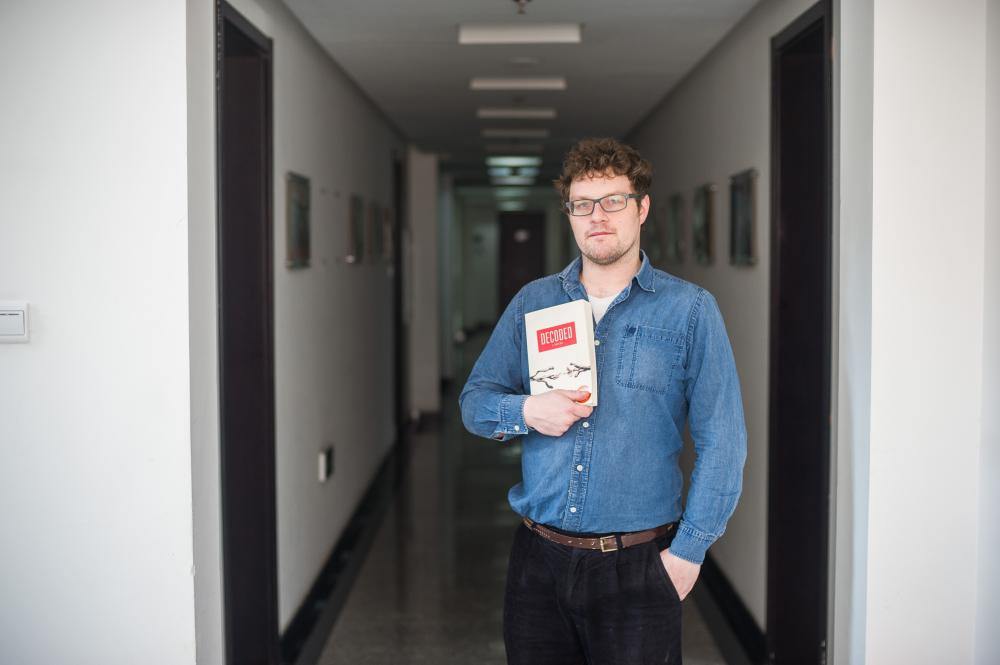
(Eric Daly, an Irish, poses for a phto with Decoded in hand. He has just finished reading the book.)
最难破译的是人的内心和命运
主持人:就你的小说而言,更多地是在写人的内心的那种孤独感,是这样吗?
麦家:我最害怕甚至是讨厌别人说我写的是谍战小说,我写的不是谍战小说,只不过用了谍战的元素。如果说破译密码,不管是《解密》《暗算》还是《风声》,表面上有一个主题就是破译密码,但是人世间最难破译的不是密码。我一直认为,人世间最难破译的密码是人的内心和命运。
主持人:我们一起来回顾一下《解密》的出生和它的重生过程。我们一开场就说过这本书写了11年,遭到出版社17次退稿。在这11年的写作过程中,你的身份在不断地发生变化,这会不会影响到《解密》的呈现?
麦家:会有影响,但是它只会让这部小说变得更加结实,更加丰富。对于一个作家来说,真是用心血在浇灌自己的作品。你人生的起伏、变故,那些越触及到灵魂的东西,越容易反映到作品里面来。浮光掠影或者说很开心的东西,可能不一定会反映到作品里,但是人生一些重大的变故,人生深刻的孤独,或者一些心酸、沧桑的东西,它是很容易沉淀到文字里面去的。
人在什么情况下可以体会到灵魂的存在?只有在痛苦的时候。人很开心时,容易忘乎所以,不亦乐乎的时候灵魂是不存在的。但当你的生活遇到变故,内心感到沧桑或有伤痛的时候,灵魂的形态就会逐渐显现。当然有时候也不那么神秘,上帝扇你一巴掌,灵魂就出现了。我觉得对一个作家来说,出现的几率越高,作品的含金量就越高。它不是轻飘飘的,沉淀下来的东西不但属于我,也属于米欧敏,属于你们大家,它是人类的结晶。
主持人:我读《解密》,觉得容金珍的命运让人很唏嘘。
麦家:痛苦的东西很容易在文字里沉淀下来,如果我生命中没有这种痛苦,也很难给这个主人公这种痛苦。成年以后的痛苦,由于你的阅历、交往能力,会努力稀释掉。但童年的痛苦是没有稀释的,那时候人懵懵懂懂,也少有倾诉的对象,没有宣泄的渠道,那些痛苦就沉淀到你的骨髓里,成为你灵魂的一部分。对于一个正常人来说,童年的痛苦可能会让他失去开心的权利,因为童年失去的东西,往往一辈子都追不回来。但是对于一个作家来说,这绝对是一件好事,因为写作归根到底是需要这种孤独感的,需要这种沧桑和心酸。
海明威说,心酸的童年是作家最好的训练。因为这成为你剪不断的尾巴,一辈子跟着你,与你如影随形。这些东西都触及灵魂。我相信一本书有人类的心跳,才能和读者心心相印,单纯追求一种感官的快乐、本能的满足,都不是文学应该承担的价值。
文学的价值就是照亮你的内心,让你的内心和其他人黏在一起,让你迈开人类的步伐,而不是个人的步伐。
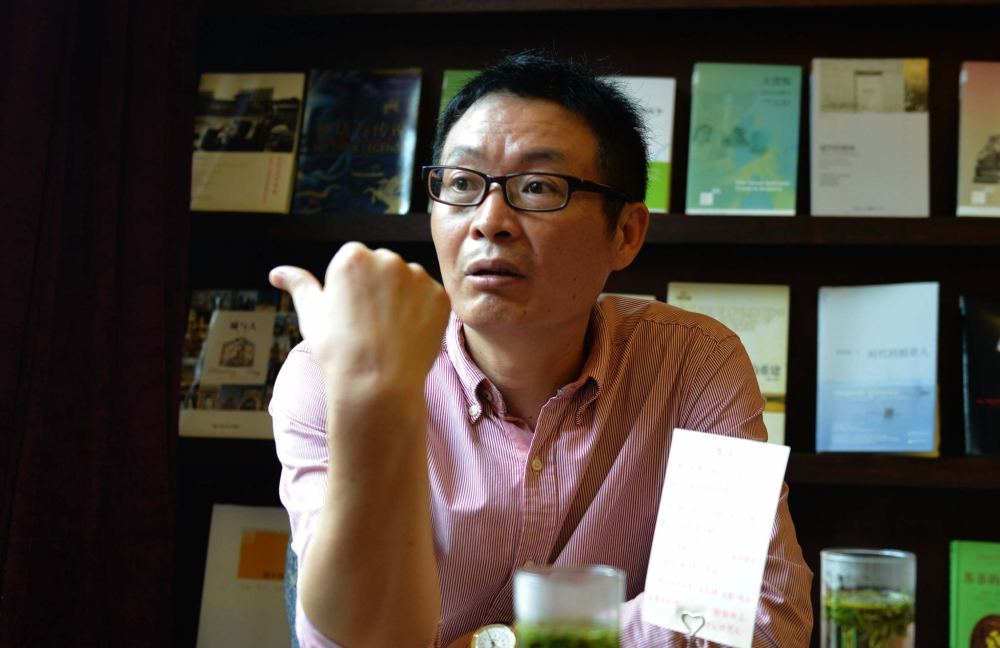
劝女孩子不要嫁给作家
主持人:麦家老师,很多人会对你个人有很多好奇,比如麦家老师你有没有自己最喜欢的作家?
麦家:当然有,正如你生活当中一定有你最喜欢的那个人。但是这种喜欢其实也是在变化的。我和文学相伴相爱相杀30多年,不同的时期,我心中有不同的偶像或英雄,早期喜欢的作家现在我不一定喜欢了,但是我依然把心里一个很特殊的位置留给他们,因为他们陪我走过了最初的文学路。
随着写作越来越深,文学书已不是我阅读的主要书籍,我现在读的大量的是历史的、哲学的、学术的,文学最多只占三分之一。
主持人:现在这个时期的麦家会比较喜欢谁呢?
麦家:我最近在读两个作家的书,都是重读了,一个是卡夫卡的《城堡》,另外一个是罗兰·巴特的《恋人絮语》。
主持人:我看到很多报道里会提到,你很喜欢博尔赫斯,在你的书籍和文字里也能够看到跟他相似的气质。你是喜欢这个作家吗?还是曾经喜欢?
麦家:曾经喜欢,现在也依然喜欢。尤其我在写《解密》的漫长的10年当中,这位作家一直非常亲密地陪伴着我。从一定意义上来说,我敢于把容金珍这样肩负着间谍身份的人物当我的小说的主人公,也是仰仗于博尔赫斯。因为以前大家都觉得间谍是通俗小说中的人物,纯文学一般不会去写。有一天我看博尔赫斯的《交叉小径的花园》,写的是一个德国间谍,我觉得人家这么一个大师都可以写间谍,我一个无名小卒为什么不能写呢?
正是由于他的那种点拨,他的那种启示,让我勇敢地走近了容金珍的世界。我觉得这很重要,它让你豁然开朗。我们人生当中有时候会被一句话或一个人擦亮你的眼睛,博尔赫斯对我而言就是这样。
主持人:你在写作的时候,是什么样的一个状态?
麦家:写作时间太漫长了,你不可能是一个状态。比如《解密》的写作跨度是11年,我现在的新作品写作跨度是4年半,什么状态都会有。有时候一个人关在深山里面,有时候到人群去写作,我也喜欢某一天下午拿一个电脑,到花园里去写作。你要打破长时间一种状态的桎梏。
写作的状态五花八门,有时候人是疯疯癫癫的。心花怒放的时候你就是一个孩子,很天真;懊恼的时候你就是一个魔鬼,对着一盆花破口大骂,各种状态都有。
作家真正进入写作状态时,不是一个正常的人。我一直劝女孩子千万不要嫁给一个作家,作家作为生活中的一个人,他实在是太不正常了。我妻子太明白了,我真的在写得开心的时候会莫名其妙地亲她一把;有时候写得不好的时候,会对着她的影子踩一脚。所以,女孩子不要嫁给作家,也不要当一个作家。
克里斯托夫:今天早上听余华老师说,他的灵魂是来自于工作。你觉得写作是一种工作吗?
麦家:如果写作是工作,我肯定不会去写作。工作是你要能主宰的,今天制定一个目标,三个月或者半年完成。而我们作家干的这个事情,第一不可能有目标,第二这种状态不是正常人的状态,有时候是疯子的状态,有时候又是天使的状态。我不是为工作而写作,而是和灵魂对话,和五百年前或五百年后的一个人对话。我想这种状态肯定不是一种工作状态,它是在拥抱自己的灵魂,也是在拥抱人类。正因为这样,它可能是非常的不正常:一方面是极度的痛苦,一方面又是少见的开心。
主持人:现场有很多年轻人,大家都知道您在《朗读者》节目上读了一封给孩子的信,也特别想知道对于今天台下的年轻人,以及更多的年轻人,有没有什么想要说的话?
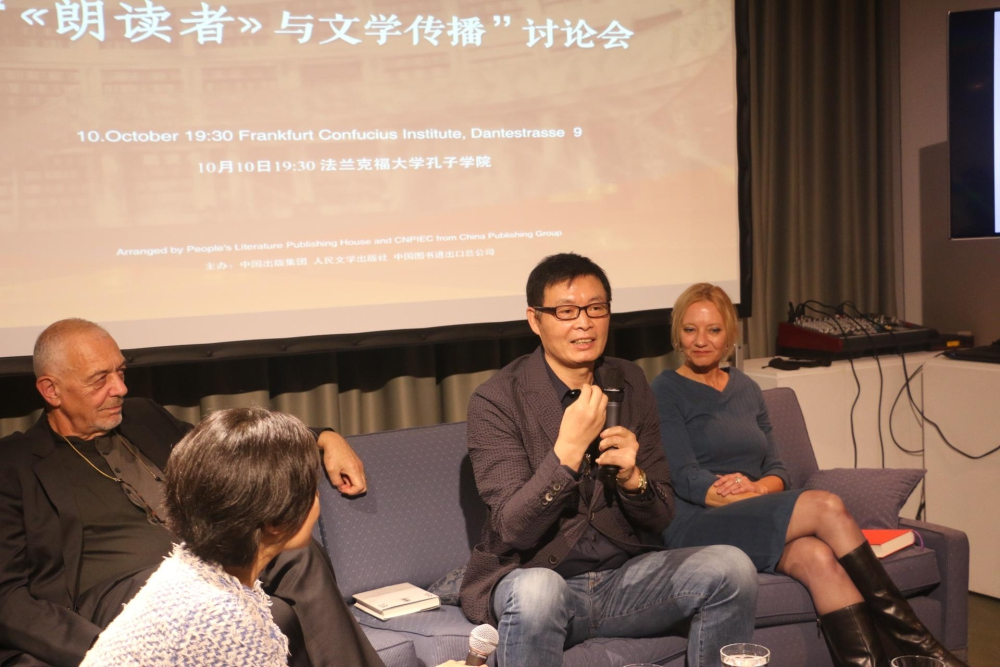
麦家:我觉得年轻真好,年轻有无限的可能;但同时我也要说我不羡慕你们。我也曾像你们这样年轻过,我知道这段时期会有很多因为幼稚而产生的陷阱。尤其是现在这个时代,生活越来越精彩,物质越来越丰富,对我们的诱惑也是越来越多,有些诱惑可能就是陷阱。到了我这个年龄,我已经非常清楚什么是陷阱,什么是真正的金子;对于一个年轻人来说,很可能他不知道。那怎么样让你去发现陷阱呢?
我自己的体会是,生活当中要有好朋友,但这种交心的机会并不是想有就容易有的,所以我们可以通过文学来了解人生。
文学不是一个专业,文学就是人生。当你打开一本文学书的时候,你就会看到人间的一些烟火气,体会到人世间的世态炎凉、悲欢离合,所有的文学就是人生的模拟训练。当你生活中没有一个知心朋友可以面对你的困惑、给你答案的时候,你真的可以打开一本文学书,通过它去体味人生,擦亮你的眼睛,这是每个人都可以做到的。所以我经常跟年轻人说,多读一点文学,就可以多了解人生。
我曾经说过这么一句话:世界很大,但文学最大,因为文学可以让世界变小,让我们长大。因为,文学里面藏着人生。
Mai Jia Talks about Decoded with Two Translators
In August 2018, Mai Jia talked with Olivia Milburn and Christopher Payne at an international book forum in Beijing about Decoded, his best known novel published in 2002. The English translation by Olivia Milburn and Christopher Payne came out in 2014 and has received good reviews in major media across the world. Olivia Milburn has translated three books by Mai Jia and received a special achievement prize last year for her translations.
Decoded, written over a period of 11 years and rejected 17 times by publishers, is a phenomenon in the history of Chinese literature. Since its first release in 2002, the simplified Chinese editions alone have sold more than one million copies. It has been translated into over 30 languages and distributed in over 100 countries. March 2019 saw the launch of a Persian-language translation.
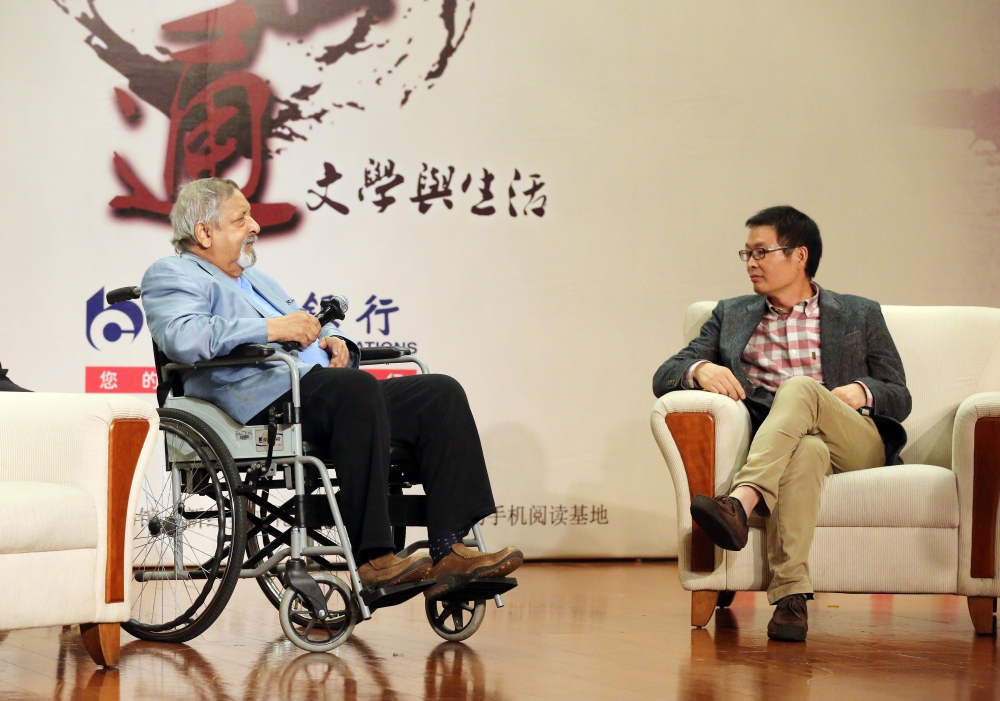
(Mai Jia in a conversation with Nobel Laureate in Literature VS Naipaul at a cultural event in Hangzhou in 2014.)
Mai Jia and his two translators talked in depth about the book, about Chinese culture, about the author’s own interpretation, about the translation. What they said could be too long a text for this dialogue if translated verbatim. For the sake of space, we regretfully present as follows a much abbreviated version of what Mai Jia said at the forum.
China is a great and profound image. If it were just a shadowy and cold existence, you wouldn’t take interest. But our culture is profound. People like Professor Olivia Milburn and Professor Christopher Payne have had profound knowledge of China. What they learned made them fall in love with China. I feel that this should make Chinese people feel proud. They help spread Chinese culture and introduce China to the world.
Because of the movies and television series adapted from my books, I have to live with the espionage novelist label. But if you consider my novels as espionage books, you could be deeply disappointed. My books have nothing to do with guns, killings and sex, essential components of espionage fiction. In February 2018 I was asked in Paris by a reader this question: why do you start the book with so many pages about the Rong family in 1876 whereas the hero appears in the story as late as in 1966. My answer was simple: I didn’t intend to write an espionage novel; espionage happens to be the hero’s occupation.
I am neither China’s Dan Brown nor China’s John le Carré. I think translators are partly to blame for this misunderstanding. If you translate more Chinese novels, readers in other countries can understand more about China and about novels by Chinese writers. Thank you for translating my novels and we Chinese feel honored. Translators are not just gardeners who work to make a seed germinate, grow and bloom. For me, the translators gave rebirth to my book. It is no exaggeration to say that the translators are the parents of the book.
Frankly, my novels don’t badmouth Chinese and don’t go out of my way to appeal to western readers. This objectivity and fairness win their respect.
I dread and hate to hear other people say that my books are all about espionage. I don’t write espionage novels. Espionage does play a part. Deciphering a code looks like a consistent theme in Decoded, In the Dark, Sound of the Wind, but the hardest code to break is the inner world of human beings and their fates.
The 17 rejections in 11 years changed me and changed the novel. It made the book better and enriched. The vicissitudes have happened in my life and those that touch my soul find their way into my novels. Fleeting impressions or something that makes me laugh and feel happy don’t necessarily present themselves into my works. These flimsy moments make me forget myself. But some major changes in life, some important solitary moments, events and things that sadden me and allow me to see the fundamentals of this world can easily make deep inroads into my books. Pains from adult life can be possibly deadened as you are an adult you are equipped with a capability to handle pains. But pains carried over from childhood wouldn’t go away so easily. As a child, you vaguely understand yourself and the world. And you have hardly anyone to confide in and you can’t easily set yourself free from negative thoughts. These pains go deep into your bones and become part of your heart and soul. For an adult, pains from childhood may deprive him of the right to feel happy all his life. What was lost in childhood can’t be retrieved all one’s life. For a novelist, however, such pains are valuable assets. In the final analysis, a writer needs such solitude and pains to write good books.
I believe a book with the heartbeat of the human beings is valuable. Literature does not deliver sensual pleasures and satisfactions. Literature sheds light into your heart and makes your heart beat with the whole humanity.
I have had a love-hate relationship with literature for over 30 years. I have different heroes and icons in different periods of my life. Some writers may have fallen out of favor with me, but I retain some special places for them in my heart because they kept my company when I was learning to write. Nowadays, I read a lot about history, philosophy and some academic subjects, and literature is no more than one third of the books that interest me. I have been rereading The Castle by Frank Kafka and A Lover’s Discourse: Fragments by Roland Barthes.
Jorge Luis Borges was and is my hero. He played a central role in my writing Decoded. Because of Borges, I dared to make Rong Jinzhen as the hero of my novel. Most people thought spies appear largely in pulp fiction and literature doesn’t write about them. Then The Garden of Forking Paths opened my eyes. If a master can put a spy in a story, why can’t I write about a spy? The revelation gave me courage. Borges was the man who opened my eyes.
Writing a novel takes a long time and you can’t remain unchanged. Take Decoded for example. I spent 11 years making it. A novel I am writing has already taken me four and half a year. Sometimes you are insane. Sometimes you behave like a child. Sometimes you are a devil. Sometimes you curse viciously and violently toward a potted plant. My wife understands what I am saying now. When writing goes smoothly, I will kiss her impulsively. When I get stuck, I could take it out on her by stamping on her shadow. A writer is abnormal while writing. I always advise girls not to marry a writer. A writer is far from being normal in everyday life.
Literature is by no means an occupation. It is life. When you read a novel, you see the world and you see the ups and downs, happiness, despair, sadness and separation of human beings. Reading literature is kind of training for life. When you don’t have a bosom friend for an answer, you read a book which can open your eyes to something you didn’t see before. Anyone could read a book. I often say to young people that reading opens your eyes to life.
A long time ago I said this: the world is big, but literature is the biggest because it can make the world small and make us grow. Therefore literature contains life. I still believe this.
